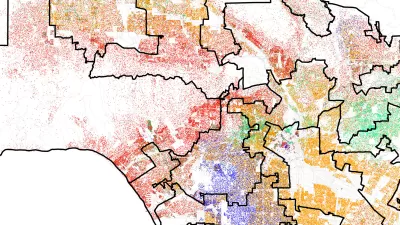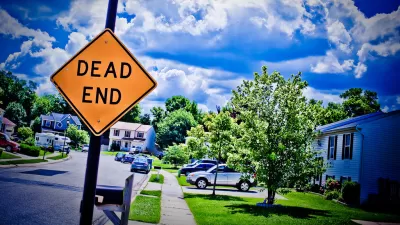Census data is already in for a couple of dozen states, and already blogs are starting to speculate about their lessons for American cities. Some commentators look at the continued decline of Rust Belt cities like Chicago and St. Louis, and suggest that suburban sprawl continues (and will forever continue) unabated. But reality is not quite so simple.
Census data is already in for a couple of dozen states, and already blogs are starting to speculate about their lessons for American cities. Some commentators look at the continued decline of Rust Belt cities like Chicago and St. Louis, and suggest that suburban sprawl continues (and will forever continue) unabated. But reality is not quite so simple.
When commentators argue about whether cities can compete with their suburbs, they don't really mean "all cities"; instead, I suspect they mean "cities that have been losing population to their suburbs." So in examining the early returns from the Census, I focused on two groups of cities: declining cities (those that have lost population since their post-WW II peak) and formerly declining cities (those that have lost population in at least one post-1950 decade, but have recovered and are now more populous than in 1950).
By my count, the Census has issued population data for only nine declining cities with over 200,000 people: Chicago, Baltimore, Washington DC, St. Louis, Newark, Jersey City, Birmingham, New Orleans, and Norfolk. Four of these cities actually gained population in the 2000s: Washington, the two New Jersey cities, and Norfolk- and in three of the cases (all but Jersey City) the city gained population for the first decade since 1970. So if anything, there has been a modest "back to the city" movement in some cities. On the other hand, one city that had gained population in the 1990s (Chicago) slipped backwards.
A second category of formerly declining cities slipped in the mid-20th century, but started to gain population in the last decade or two of that century. This category includes Indianapolis, Fort Worth, Kansas City, Seattle, Denver, Portland, Omaha, Winston-Salem, and Baton Rouge. Not one of these "comeback cities" lost population; it appears that once a city regains its appeal, it keeps growing again. (Caveat: I am sure some of these cities grew by annexing their suburbs).
Of course, all of this could be balanced out by population losses among growing cities. Among cities that consistently gained population in the last half of the 20th century, census data is available for Houston, San Antonio, Dallas, Austin, Charlotte, El Paso, Las Vegas, Oklahoma City, Raleigh, Colorado Springs, Tulsa, Arlington (Texas), Wichita, Aurora, Corpus Christi, Plano, Greensboro, Lincoln, Durham, Laredo, Lubbock, and Garland. Only one of these cities (Tulsa) lost people in the 2000s, and by the narrowest of margins (about 2000 people).
So far it appears that the 2000s has been a better decade for cities than the last decades of the 20th century- albeit not the complete reverse of suburbanization that some pundits appear to yearn for. Not every declining city gained population, but on balance there were more winners than losers, and more winners (if "winning" is defined as "gaining population")* than in prior decades.
Another issue that I find interesting is the relationship between mid-decade Census estimates and the 2010 Census. As yearly Census estimates came in over the past decade, commentators battled over their meaning. Does it matter if a Census estimate in year X shows more big cities growing? Or does it matter more if the trend appears to be reversed in year Y?
Intercensal estimates were not consistently wrong in any one direction. The 2009 estimates showed Chicago and St. Louis growing- results quite contrary to the 2010 Census. But in some cities (such as Washington and Newark), the 2009 Census estimate came within a couple of thousand people of the 2010 result. And the 2009 estimate failed to catch Norfolk's growth, and underestimated Charlotte's growth by 20,000 people. So on balance, the best one can say about intercensal estimates is that they have a margin of error of as much as 11 percent (the amount by which the Census overestimated the 2009 populations of St. Louis and Omaha).
*One could also define "winning" as increased income. This issue I shall address in some future post, I hope.

Maui's Vacation Rental Debate Turns Ugly
Verbal attacks, misinformation campaigns and fistfights plague a high-stakes debate to convert thousands of vacation rentals into long-term housing.

Planetizen Federal Action Tracker
A weekly monitor of how Trump’s orders and actions are impacting planners and planning in America.

In Urban Planning, AI Prompting Could be the New Design Thinking
Creativity has long been key to great urban design. What if we see AI as our new creative partner?

Portland Raises Parking Fees to Pay for Street Maintenance
The city is struggling to bridge a massive budget gap at the Bureau of Transportation, which largely depleted its reserves during the Civd-19 pandemic.

Spokane Mayor Introduces Housing Reforms Package
Mayor Lisa Brown’s proposals include deferring or waiving some development fees to encourage more affordable housing development.

Houston Mayor Kills Another Bike Lane
The mayor rejected a proposed bike lane in the Montrose district in keeping with his pledge to maintain car lanes.
Urban Design for Planners 1: Software Tools
This six-course series explores essential urban design concepts using open source software and equips planners with the tools they need to participate fully in the urban design process.
Planning for Universal Design
Learn the tools for implementing Universal Design in planning regulations.
Gallatin County Department of Planning & Community Development
Heyer Gruel & Associates PA
JM Goldson LLC
City of Camden Redevelopment Agency
City of Astoria
Transportation Research & Education Center (TREC) at Portland State University
Jefferson Parish Government
Camden Redevelopment Agency
City of Claremont






























